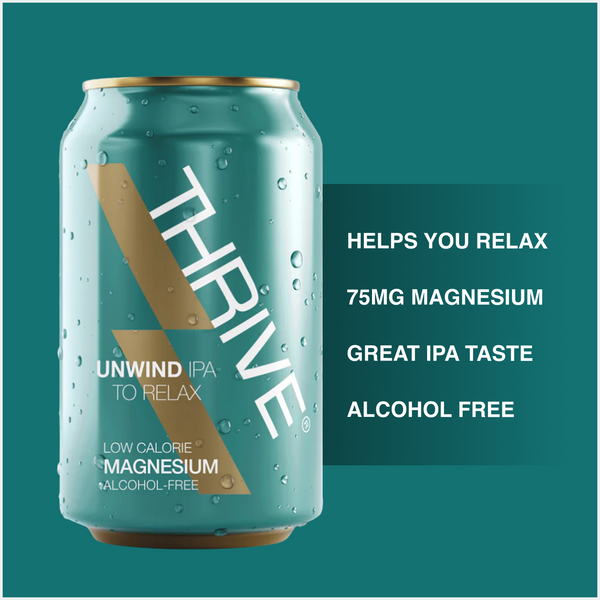Magnesium doesn’t get the hype that protein does, but if you want better recovery, calmer evenings, and deeper sleep, it matters. That’s why THRIVE® Unwind includes 75 mg of magnesium in every can. No pills. No powders. Just a refreshing, alcohol-free beer that helps you wind down.
What magnesium actually does (and why athletes need more)
- Relaxes muscles after tough sessions 1,2
- Calms your nervous system 1
- Supports quality sleep / reduces tiredness & fatigue 2 (keep expectations realistic—evidence for sleep is mixed 6,7,8)
- Cofactor in 300+ enzymatic reactions affecting energy and muscle function 5
Here’s the catch: many adults fall short on daily magnesium; the EU Adequate Intake is ~350 mg/day (men) and 300 mg/day (women) 3. Athletes can lose more through sweat and training stress; reviews suggest ~10–20% higher needs during intense exercise 4, and endurance work/sweating can increase losses 9.
Meet THRIVE® Unwind: your tasty magnesium top-up
- 75 mg magnesium per can
- 0% alcohol
- Refreshing, easy to drink, no chalky tablets or mixing required
Think of it as a functional nightcap, only tastier. (And yes, it’s perfectly fine during the day too for a mini zen moment. We’re about 86% sure you won’t instantly fall asleep 😴.)

THRIVE® Unwind — IPA with 75 mg Magnesium
Pick a pack size and add to cart.
When to drink Unwind for best results
- After training → help muscles relax and replenish
- With dinner → a calm glide into your evening
- About an hour before bed → set the stage for deeper sleep
How Unwind fits into a recovery routine
- Hydrate + electrolytes after sweating
- Protein & carbs for repair and glycogen
- Unwind for that magnesium assist and mental switch-off
- Screens down, lights low 30–60 minutes before bed
Cycling and running culture here runs deep...so does sweat loss. Unwind slots into post-ride cafés, club socials and weeknight recovery. Fast delivery in BE & NL. Shop Unwind.
References
- EFSA. Scientific Opinion on magnesium health claims (electrolyte balance; energy metabolism; nervous system; muscle function; psychological function…). EFSA Journal 2009;7(9):1216. Link
- EFSA. Scientific Opinion on magnesium and reduction of tiredness and fatigue. EFSA Journal 2010;8(10):1807. Link
- EFSA. Dietary Reference Values for magnesium (AI: 350 mg men / 300 mg women). EFSA Journal 2015;13(7):4186. Link
- Tarsitano MG, et al. Effects of magnesium supplementation on muscle soreness and recovery. Journal of Translational Medicine. 2024. PubMed · Open access
- Fatima G, et al. Magnesium Matters: A Comprehensive Review of Its Vital Roles. Nutrients. 2024. Open access
- Schuster J, et al. Magnesium bisglycinate for poor sleep: randomised, placebo-controlled trial. Nature & Science of Sleep. 2025. Open access
- Hausenblas HA, et al. Magnesium-L-threonate improves sleep quality in adults: randomised trial. 2024. PubMed · Open access
- Breus MJ, et al. Effectiveness of Magnesium Supplementation on Sleep (review—evidence mixed). Medical Research Archives. 2024. Link
- Zhang H, et al. Strenuous/endurance exercise increases magnesium losses (serum ↓, urinary ↑). Journal of Trace Elements in Medicine and Biology. 2023. Link
- Voedingscentrum. Magnesium—functie, bronnen, advies (Dutch). Link




